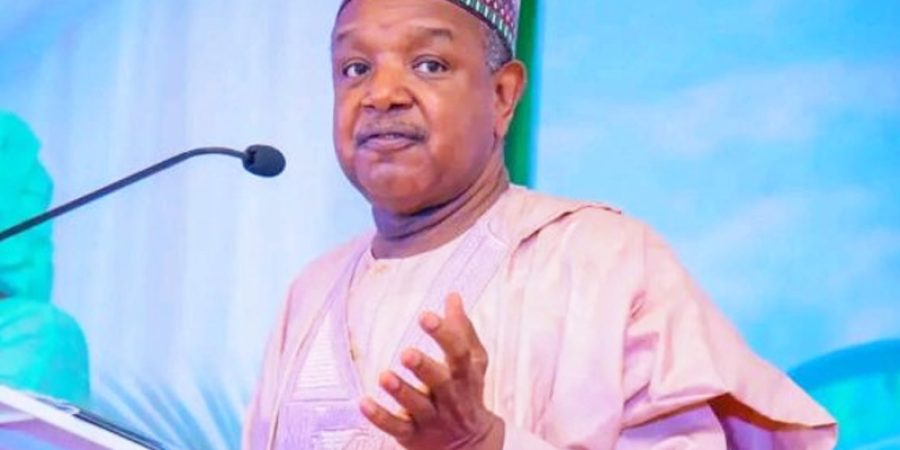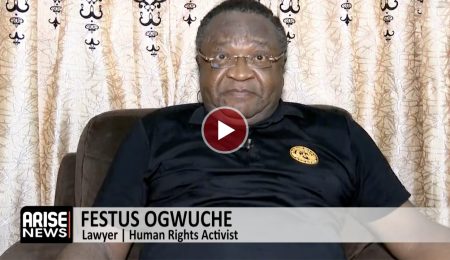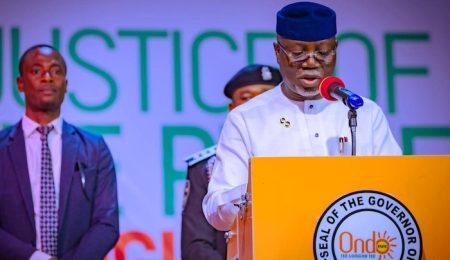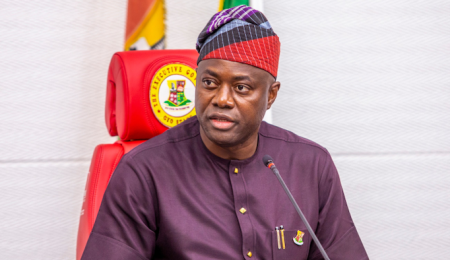Minister of Budget and Economic Planning, Senator Abubakar Bagudu, on Wednesday said the total net statutory revenue and Value Added Tax (VAT) allocation to states and local governments increased to N991.81 billion in June 2025, from N458.81 billion in May 2023. Bagudu said this reflected an increase of N533 billion or 116.17 per cent across the federation.
He stressed that the figure excluded Electronic Money Transfer (EMT) levy, FX gains, and augmentations received by states.
The minister said the north made more significant economic progress under President Bola Tinubu, leading to massive debt reduction by the states.
Bagudu spoke in Kaduna during a presentation at a two-day interactive session on government-citizen engagement, with the theme, “Assessing Electoral Promises: Fostering Government-Citizen Engagement for National Unity.”
The session was organised by the Sir Ahmadu Bello Memorial Foundation (SABMF).
The minister’s clarification came against the backdrop of recent allegations of infrastructural bias levelled against the president by some northern politicians.
The foundation’s engagement was to evaluate Tinubu’s election promises to its members. It attracted key northern ministers, including Minister of Information and National Orientation, Mr Mohammed Idris; Minister of Defence, Mr Mohammed Badaru; and Minister of Agriculture and Food Security, Senator Abubakar Kyari; as well as National Security Adviser (NSA), Mallam Nuhu Ribadu.
The engagement, which commenced on Tuesday, was attended by over 60 northern federal political appointees, including the Secretary to the Government of the Federation (SGF), Senator George Akume, who led the delegation of ministers and heads of some ministries, departments and agencies; northern state governors; and thought leaders in the region, particularly Arewa Consultative Forum (ACF).
Bagudu said the president’s bold economic reforms had increased revenue for the states, even as their debts had fallen, freeing up more resources for social and infrastructural development.
He stated that the revenue situation had greatly benefited the 19 northern states, whose federally-allocated revenue had increased significantly since Tinubu took office on May 29, 2023.
According to the minister, the significant increase in allocation was mainly due to the federal government’s bold reforms, including the removal of the fuel subsidy.
He stated that although the reforms caused some short-term pains, the fiscal space created allowed for direct transfers of more oil revenues to the Federation Account, thereby increasing statutory allocations to subnational governments.
He said, “By ending the fuel subsidy, President Tinubu made a hard but necessary call—liberating trillions of naira to expand federal allocations by over 340 per cent. States now have the means to invest in their future.”
Bagudu stated that while every state in the federation recorded significant increases in monthly allocations, the northern states received a substantial raise.
Bagudu cited Gombe State, which he said had the sharpest rise, from N6.69 billion in May 2023 to N24.91 billion in 2025, amounting to a 272.35 per cent increase. He also referenced Kaduna State, whose allocation increased from N11.94 billion to N42.01 billion, a rise of N30.07 billion, and 251.84 per cent leap.
According to him, a regional breakdown of the benefits to the north showed that North-central’s share of revenue increased by 145 per cent, North-east by 149 per cent, and North-west by 143 per cent.
“These show how removing subsidies and enhancing revenue-sharing mechanisms have directly benefited State Governments, enabling them to fund their development priorities,” the minister stated.
Bagudu informed the audience that the fiscal position of subnational governments had also improved due to a significant reduction in domestic debt, made possible by the availability of additional funds from the Federation Account.
He explained that the debt portfolio of the 36 states and Abuja was reduced by 33.4 per cent, from N5.8 trillion to N3.8 trillion, under the president’s deft financial engineering. Isolating the north’s share of this, the minister stated that the region’s 19 states experienced a 42.06 per cent reduction, from N1.98 trillion to N1.14 trillion during the period.
He added, “These results demonstrate the tangible benefits of macro-fiscal reforms. The Renewed Hope Agenda is delivering real value to citizens through improved subnational fiscal capacity. The Tinubu administration at the centre remains committed to fiscal transparency, equitable distribution, and continued collaboration with states and LGAs.”
He emphasised that the president’s administration had demonstrated a comprehensive and strategic approach to addressing the economic, social, and governance challenges in northern Nigeria.
Bagudu said, “By implementing bold reforms, investing in critical infrastructure, empowering local governments, and prioritising security and social welfare, the administration is working to create an environment conducive to sustainable development and improved quality of life for the people of the region.”
Bagudu buttressed his submission by citing key infrastructural projects of the federal government in the north, including the Sokoto-Badagry Superhighway, the dualisation of Kano-Maiduguri Road, Sokoto-Gusau-Funtua-Zaria Highway, Abuja-Keffi-Makurdi Road, Ilorin-Jebba-Minna Road, Abuja-Lokoja Road, and Kano-Katsina Road.
Other road projects he mentioned included Abuja-Kaduna-Kano Expressway, Malando-Garin Baka-Ngaski-Warra Road, Bid-Zungeru-Kagara Road, Gombe-Biu Road, Yola-Numan-Jalingo Road, Kaduna-Kano Railway, Light Rail Projects in Kaduna, Kano, and FCT, and AKK Gas Pipeline.
Bagudu also mentioned the enhancement of healthcare facilities under Tinubu and stated that over 1,003 primary healthcare centres were revitalised in two years, adding that 10 of the country’s upgraded medical warehouses were in the north.
He stated that there had been a significant upgrade in federal teaching hospitals and medical centres across Katsina, Bauchi, Yobe, Borno, Zaria, Adamawa, Kebbi, Taraba, and Kano.
He pointed out that under the MAMII programme, the region recorded 13.1 million antenatal visits, 4.2 million safe deliveries, 4,000 free Caesarean sections, and 6 million women receiving nutritional support. “This is not charity. It is health justice delivered with intent,” he stated.
Bagudu said Tinubu’s policies were equitable and fair to all regions, explaining that the president ensured that his Renewed Hope legacy projects were distributed equally to all.
“President Bola Ahmed Tinubu’s administration has demonstrated a comprehensive and strategic approach to addressing the economic, social, and governance challenges in Nigeria,” he stated.
The citizen engagement, which took place from Tuesday to Wednesday, assessed the implementation of the election promises Tinubu made to the foundation during the 2023 general election.
While some northern leaders believed the region had not been treated fairly, the 19 governors and federal political appointees held a different view, supported by facts and data about the president’s programmes in the area. They commended the Tinubu administration for its “high performance in delivering electoral promises in many areas, especially security and infrastructural development”.
That psotion was contained in a communique issued at the end of the event. The communique signed by Abubakar Umar, Director General of SABMF, on behalf of the participants, also “praised the increased equitable resource availability to subnational authorities”.
The communique, however, called for substantial investment in education to address the out-of-school children crisis, especially in the north. The communique acknowledged the critical role of the north in Nigeria’s political stability and economic development.
Deliberations covered key areas, including national security, governance, agriculture, food security, infrastructure, and human capital development.
The communique stated that the progress made by Tinubu was visible, saying, “Major infrastructure projects are advancing, including highways, gas pipelines (AKK), oil exploration (Kolmani), and rural irrigation schemes.”
The communique said, “The problem of Almajiri and out-of-school children remains a key concern of Northern Nigeria.”
It called for strengthening of the education sector to promote social inclusion and reduce insecurity.
The communique emphasised the importance of equitable resource distribution in addressing regional imbalances.
It commended Tinubu for increased financial allocation to subnational governments, saying it is a step in the right direction. It advocated the institutionalisation of government-citizen dialogue at national and state levels.
The communique stated that the government had demonstrated openness to dialogue and continuous citizen engagement, calling for inclusive and community-based strategies in addressing national challenges.
The participants also advocated greater collaboration between the northern states and the federal government. They called for engagement with civil societies, traditional, and religious leaders to promote responsible governance.
The communique said, “We must promote responsible media practices to enhance public trust and national cohesion. Northern Nigeria acknowledges and commends the administration’s high performance. We call for more commitment to transparency, fairness, and equity as elements that would foster national unity and democracy.”
Emmanuel Addeh, James Emejo and John Shiklam
Follow us on:



